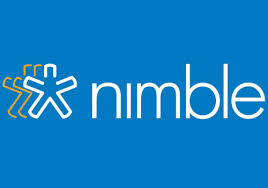记忆方法
1. PIE root *nem- "divide, distribute, allot; take" (cf. Greek nemein "deal out," nemesis "just indignation," Latin numerus "number") => nim- "take, grasp, seize" => OE: niman "take, grasp, seize".
2. nim- "take, grasp, seize" + -le => -ble (see limb, 类比变形) => nimble "quick to grasp".
3. => agile, light-footed.
4. 同源词:nim, numb, nimble.
5. 5. numb => nimble. 为什么能从 numb 推导出 nimble 的含义呢?因为他们两是同源词,也就是说这两兄弟是同一个爹生的,numb 的本义是“被抓住、被抱住”,因为人一但被抓住、被抱住后就动弹不得了,所以由此就引申为了“麻木”之意。nimble 的本义也就是“抓、抱”之意,只是拓展成了“快速地抓、抱(quick to grasp)”,当然只有很敏捷才会“快速地抓住”啊,所以就引申为“敏捷的、灵敏的、敏感的、机智的”之意。-le (diminutive suffix, frequentative suffix, 也许暗含表达了一种小巧灵活之意)。
6. 谐音“灵吧” --- 灵活吧,灵巧吧!
7. 谐音“凌波” --- 凌波微步 --- 想一想段誉练成凌波微步后,逃跑起来是不是很灵巧、敏捷啊!让敌人想打打不着,想追追不上。
2. nim- "take, grasp, seize" + -le => -ble (see limb, 类比变形) => nimble "quick to grasp".
3. => agile, light-footed.
4. 同源词:nim, numb, nimble.
5. 5. numb => nimble. 为什么能从 numb 推导出 nimble 的含义呢?因为他们两是同源词,也就是说这两兄弟是同一个爹生的,numb 的本义是“被抓住、被抱住”,因为人一但被抓住、被抱住后就动弹不得了,所以由此就引申为了“麻木”之意。nimble 的本义也就是“抓、抱”之意,只是拓展成了“快速地抓、抱(quick to grasp)”,当然只有很敏捷才会“快速地抓住”啊,所以就引申为“敏捷的、灵敏的、敏感的、机智的”之意。-le (diminutive suffix, frequentative suffix, 也许暗含表达了一种小巧灵活之意)。
6. 谐音“灵吧” --- 灵活吧,灵巧吧!
7. 谐音“凌波” --- 凌波微步 --- 想一想段誉练成凌波微步后,逃跑起来是不是很灵巧、敏捷啊!让敌人想打打不着,想追追不上。
中文词源
nimble 灵活的,敏捷的
来自PIE*nem,分开,分配,拿,带,词源同number,numb.引申词义灵活的,敏捷的。
英语词源
- nimble (adj.)
- "agile, light-footed," c. 1300, nemel, from Old English næmel "quick to grasp" (attested but once), related to niman "to take," from Proto-Germanic *neman (cognates: Old Saxon, Old Dutch, Gothic niman, Old Norse nema, Old Frisian nima, German nehmen "to take"), from PIE root *nem- "to divide, distribute, allot," also "to take" (cognates: Greek nemein "to deal out," nemesis "just indignation," Latin numerus "number," Lithuanian nuoma "rent, interest," Middle Irish nos "custom, usage"). With excrescent -b- from c. 1500 (compare limb (n.1)). Related: Nimbleness. In 17c., English had nimblechaps "talkative fellow."
权威例句
- 1. He was a nimble-footed boy of ten.
- 他是个步伐敏捷的10岁男孩。
- 2. You need nimble fingers for that job.
- 干这活需要手指灵巧。
- 3. He has a nimble tongue.
- 他能说会道.
- 4. He is a nimble and versatile wit.
- 他是一个机敏而又多才多艺的才子.
- 5. Val, who was light and nimble on her feet, learnt to dance the tango.
- 脚步轻盈灵活的瓦尔学会了跳探戈舞。

